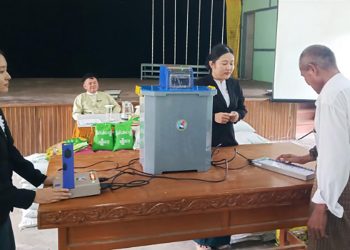The Myanmar government is considering imposing community quarantines in some places to contain the spread of COVID-19, with the country’s coronavirus toll so far standing at 15 confirmed cases and one death as of Tuesday evening.
Following the country’s first death related to COVID-19 on Tuesday morning, State Counselor Daw Aung San Suu Kyi addressed the nation on television on Tuesday evening, saying that Myanmar is doing its best to fight the global pandemic and expressed confidence that Myanmar “could overcome the pandemic with unity and collective strength”, adding that the public’s contribution to the effort to fight the virus had been more than satisfactory.
Following the Ministry of Health and Sports (MOHS)’s warning that a major outbreak of COVID-19 was possible after a migrant returnee in Yangon tested positive on Monday, concerned citizens have been urging the government to announce whether a lockdown would be put in place, and if so, when.
“People are concerned about when it [a lockdown] is coming. If needed for the country’s sake, we will restrict movements in some places, like a community quarantine,” she said.
The State Counselor added that if the government imposes community quarantines, “we will inform in advance”, and urged public cooperation.
She also said the new COVID-19 response committee formed on Tuesday will ensure the country does not run out of food and medicines, and that stability is maintained in the areas where the community quarantines are ordered.
As COVID-19 can spread rapidly, she said, those who have potentially been infected will be put under a compulsory 14-day quarantine. She urged people to strictly follow the health guidelines from the MOHS.
So far, a number of people as well as some residential areas in the country have been quarantined, after it was determined they had close contact with those who tested positive.
The MOHS has urged anyone with symptoms including fever, cough and difficulty breathing to immediately contact their respective health departments.
She urged people to stay home as much as possible. “For those whose houses are not spacious enough, we understand your difficulty,” she said, urging them “to be patient” for a certain period in order to help contain the spread of COVID-19.
“Although it [COVID-19] is imported, since it is in the country, it can lead to widespread infections … The best protection is to avoid crowds, either inside the home or outside. Staying close together with extended families and relatives is like going out into a crowd. Please help protect your health and others’ as well.”
She said implementation of the government’s plan to limit the negative economic impact of the virus by providing loans for needy businesses has begun, and would help employers pay workers’ salaries.
She also gave special thanks to nurses, doctors and all medical workers who are on the front lines of the COVID-19 crisis, dealing with patients and supervising quarantine centers despite a lack of supplies and equipment, as well as the local administrative officers and volunteers who are contributing to the fight against the global disease.
“They are the heroes fighting for the people,” she said.

















